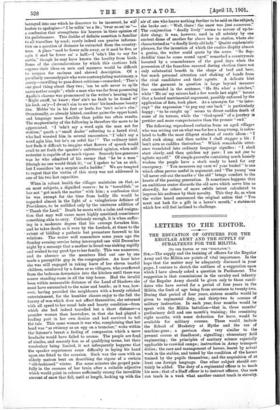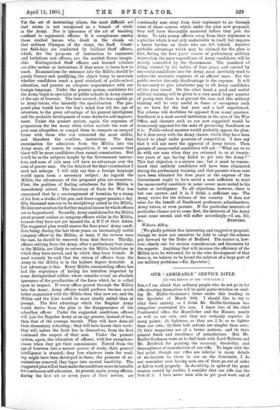LETTERS TO THE EDITOR.
THE EDUCATION OF OFFICERS FOR THE REGULAR ARMY AND THE SUPPLY OF . SUBALTERNS FOR THE MILITIA.
[To THE EDITOR OP THE " SPECTATOR:1
Sin,—The supply and the training of officers for the Regular Army and the Militia are points of vital importance. In the hope that the matter may be adequately discussed in your pages, I venture to sketch the outlines of a suggestion upon which I have already asked a question in Parliament. The suggestion is that commissions in the cavalry and infantry of the Regular Army should be given only to those candi- dates who have served for a period of four years in the Militia, the limit of age being from seventeen to twenty-two. During that period of four years, sixteen months would be given to regimental duty, and thirty-two to courses of military instruction. In each year, four months would be spent with the Militia battalion—that is, three months' preliminary drill and one month'e training; the remaining eight months, with some dednction for leave, would be available for military courses. These would, include the School of Musketry at Hythe and the use of machine-guns ; a garrison class very similar to the present course at Sandhurst; signalling ; elementary field engineering; the principles of sanitary science especially applicable to crowded camps ; instruction in Army transport duties; the care and management of horses, learnt by actual work in the stables, and tested by the condition of the horses trained by the pupils themselves; and the acquisition of at least one foreign language. One other subject should cer- tainly be added. The duty of a regimental officer is to teach his men ; that of a Staff officer is to instruct officers. One man can teach in a week what another cannot teach in eternity. Yet the art of instructing others, the meat Moult art that exists, is not recognised as a branch of study in the ,Army. Ner is ignorance of the art of teaching confined to regimental officers. It is conspicuous among those exalted heroes who dwell in the clouds on that military Olympus of the Army, the Staff. Count- less field-days are conducted by brilliant Staff officers, which, for the_ purposes of instruction to regiments and battalions and officers, are the sorriest farces imagin- able. Distinguished Staff officers and learned scholars are alike useless as instructors if they scorn to learn how to teach. Examinations for entrance into the Militia should be purely literary and qualifying, the object being to ascertain whether candidates reach a good standard of public-school education, and possess an adequate acquaintance with one foreign language. -Under the present system, candidates for the Army begin to specialise at public schools in Army classes at the-age of fourteen. The best succeed; the less capable go to Army tutors, who intensify the specialisation. The pro- posed plan would leave the boy's mind free till the age of seventeen, to the great advantage of his general intelligence and the probable development of some desire for self-improve- ment. Under the present system, again, the expenses of preparation for the Army often either exclude the sons of poor men altogether, or compel them to compete on unequal terms with those who can command the most skilful, and therefore the costliest, instruction. The final examination for admission from the Militia into the Army must, of course, be competitive, if we assume that there will be more candidates than vacant commissions. But it will be in the subjects taught by the Government instruc- tors, and sons of rich men will have no advantage over the 130.1113 of poorer men. On the details of the final examination I need not enlarge. I will only say that a foreign language would again form a necessary subject.. As regards the Militia, the advantages of the proposed plan are numerous. First, the problem of finding subalterns for the Militia is Immediately solved. The Secretary of State for War has announced that by a rearrangement of bounties, by a stamp of his foot, a stroke of his pen, and three copper pennies a day, fifty thousand men are to be straightway added to the Militia. He does not mention the further magical means by which officers are to be produced. Secondly, Army candidates for the Militia are at present useless as company officers whilst in the Militia, because they have not yet learned the A B C of their duties. The suggested plan would ensure the four-years' Army candi- date being, during the last three years, an increasingly useful company officer in the Militia; at least, if the reverse were the case, he should be removed from that• Service. Thirdly, officers retiring from the Army, after a preliminary four years in the Militia, are likely to return to the Militia battalions in which they have served, and in which they have friends. It need scarcely be said that the retuin of officers• from the Army to the Militia is in the highest degree desirable. A last advantage is this. Every Militia commanding officer has had the experience of having his battalion inspected by BOW distinguished soldier, whose remarks reveal an absolute ignorance of the peculiarities of the force which he is called upon to inspect. If every officer passed through the Militia into the Army, Army officers would perforce become much better acquainted with the Militia than they now are, and the Militia and the Line would be more closely united than at present. The first advantage which the Regular Ariny would derive from the plan is the disappearance of the schoolboy officer. Under the suggested conditions officers will join the Regular Army at an age greater, instead of less, than that of the average recruit. They will have done all their elementary schooling; they will have learnt their work; they will, unless the fault lies in themselves, from the first command the respect of their men. Under the present system, again, the education of officers, with few exceptions, ceases when they get their commissions. Forced from the age of fourteen into a narrow groove of study, their general intelligence is stunted; they lose whatever taste for read- ing might have been developed in them; the pressure of ex- aminations removed, they lapse into mental inactivity. The suggested plan will at least make the conditions more favourable for continuous self-education. At present, again, young officers, during the first six or seven years of their service, are
continually sent away from their regiments to go through some of those courses which, under the plan now, proposed, they will have thoroughly mastered before they join the Army. To take young officers away from their regiments is a practice which is not only undesirable in itself, but imposes a heavy burden on those who are left behind. Another probable advantage which may be claimed for the plan is that, during the four years' course of preliminary military instruction, the mess expenditure of Army candidates will be strictly controlled by the Government. The standard of living created by the habits of four years, and carried by successful candidates into the Army, must inevitably tend to reduce the excessive expenses of an officers' mess. For the public service the only disadvantage is the expense. It will be necessary to give subalterns' pay to all Army candidates all the year round. On the other hand, a good and useful military training will be given to a very much larger number of young men than is at present the case, and this military training will be very useful in times of emergency such as we have for the last year and a half experienced. The scheme will doubtless be opposed from many quarters. • Sandhurst is a most sacred institution in the eyes of the War
Office, and changes such as are now suggested would be strenuously opposed for the sake of preserving Sandhurat as it is. Public-school masters would probably oppose the plan, for it does away with, the Army classes, which they have been forced to adopt under pressure of competition. I dare say that it will not meet the approval of Army tutors. Then parents of unsuccessful candidates will ask: "What are we to- do with our sons when they are returned to us at twenty-- two years of age, having failed to get into the Army P." - This last objection is a serious one; but it must be remem- bered that unlikely candidates will have been- eliminated during the preliminary training, and that parents whose sons have been educated for four years at the expense of the- Government ought to have saved a sum sufficient to start the unsuccessful candidate in some career more suited to his tastes or intelligence. To all objections, however, there is but one answer, and it is, I think, a sufficient one. The Army exists for the defence of the country. It does not exist for the benefit of Sandhurst professors, schoolmasters, Army tutors, or even parents. If' the particular interests of particular classes are to come first, the interests of the Army must come second, and will suffer accordingly.--I am, Sir,
Woburn Abbey. BEDIVED.
[We gladly publish this interesting and suggestive proposal, though we must not ourselves be held to adopt the scheme put forward by the Duke of Bedford. The matter is, how- ever, clearly one for serious consideration and discussion by the experts. Anything that will increase the efficiency of the Militia is to be welcomed, for in the wise development of that force is, we believe, to be found the solution of a large part of our military problems.—En. Spectator.]







































 Previous page
Previous page